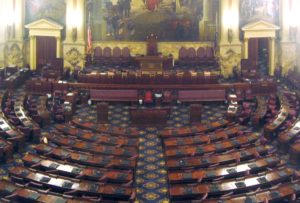 HARRISBURG, Pa. – A group of atheists, upset that they were not allowed to give invocations in front of the Pennsylvania House of Representatives, have filed a lawsuit against the Commonwealth.
HARRISBURG, Pa. – A group of atheists, upset that they were not allowed to give invocations in front of the Pennsylvania House of Representatives, have filed a lawsuit against the Commonwealth.
The Pennsylvania House of Representatives, in keeping with a longstanding tradition, invites a chaplain to offer a prayer at the beginning of each meeting of the House. The person offering the prayer, according to the House’s general operating rules, must be “a member of a regularly established church or religious organization or shall be a member of the House of Representatives.”
However, a group of atheists is now seeking to change those requirements.
In 2014, Carl Silverman with the organization Pennsylvania Nonbelievers contacted the Pennsylvania House, asking if he could serve as House Chaplain and deliver an invocation to the house. His request was denied.
“We do not believe that governmental bodies are required to allow non-adherents or nonbelievers the opportunity to serve as chaplains,” Samuel Smith, the former Speaker of the House, explained to Silverman in a letter denying his request. “…We disagree with your assertion that the House may not disallow atheists from serving as chaplains.”
Then, in 2015, Alex Luchenitser with Americans United for Separation of Church and State asked if certain atheists could deliver nontheistic prayers in front of the House. Like Silverman’s, his request was denied. “We cannot approve your request,” a letter from Parliamentarian Clancy Myer stated.
In response to these rejections, a coalition of atheist groups filed a federal lawsuit on Thursday against the Pennsylvania House.
“Just like people who believe in God, atheists and Humanists are capable of delivering inspiring and moving invocations,” Luchenitser said in a statement. “There is no good reason for the House to exclude them.”
The 123-page lawsuit acknowledges that there is a “significant difference” between the atheists who filed the lawsuit and theistic chaplains—namely, “the former believe in God, while the plaintiffs do not.” But disallowing atheists to deliver the invocations is a violation of the U.S. Constitution, the lawsuit argues.
“If allowed to give opening invocations at House daily sessions, the plaintiffs … would invoke authorities or principles such as the U.S. Constitution, the power of the people, democracy, equality, inclusion, reason, cooperation, fairness, justice, and the greater good,” the lawsuit explains.
The lawsuit then gives examples of prototypical atheistic invocations. Instead of mentioning God, the invocations include references to people like Albert Einstein, Thomas Jefferson, and Carl Sagan.
The lawsuit will be heard in the U.S. District Court for the Middle District of Pennsylvania. State officials will likely argue that invocations from atheists are not in line with the House’s tradition that dates back more than 100 years.
“We view the opening prayer as an opportunity for the members of the House to seek divine intervention in their work and in their lives,” Smith wrote in his letter to Silverman. “We honor requests from religious leaders of any regularly established church or congregation to serve as chaplains. […] Our intention is to continue our current practices which are based on the historical traditions of the House of Representatives that date back to the 18th Century.”
Become a Christian News Network Supporter...


